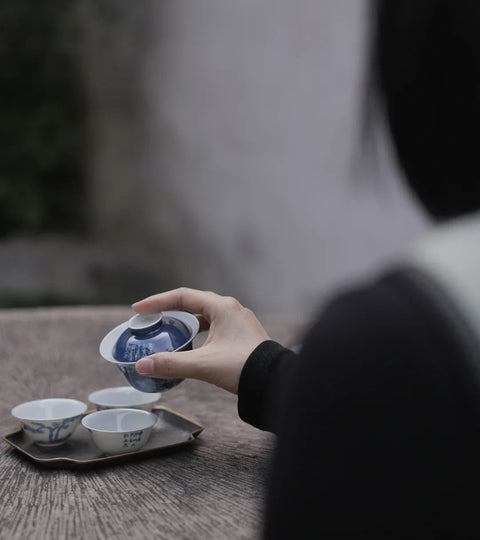This year's trip to Jingdezhen brought me one of those unexpected encounters that stay with you long after you've returned home. Through a friend's introduction, I met Guo Haoying and Wang Yibing, the young couple behind Fu Shan Xu tea studio. What began as a simple visit to their new space in Jingdezhen's Pottery Workshop turned into an enchanting evening that stretched from 10 PM well into the small hours of the night.

As Yibing skillfully prepared cup after cup of Chaozhou gongfu tea with the practiced grace that comes from a lifetime of familiarity, we found ourselves deep in conversation about their love story, the birth of their brand, and our shared passion for tea, tea vessels, and the rich culture of gongfu tea. Looking back, it was one of those beautiful meetings where time simply melts away.
Haoying hails from Guangzhou, while Yibing is from Chaozhou—both fellow Guangdong natives who met as classmates at the Jingdezhen Ceramics University. When I first met Haoying, I was immediately struck by his warmth. Small eyes that disappear into crescents when he smiles, a round, cherubic face, and an infectious laugh—you can tell within moments that he's the kind of person who puts everyone at ease. Yibing, petite and slender with delicate features, carries herself with a quiet elegance that reminds me of those refined young ladies from scholarly families in the Republican era in the early 1900s—gentle, thoughtful, and graceful.
We clicked instantly. While Haoying focused on ceramics, Yibing pursued what she laughingly calls "a not-so-serious major"—business management. But don't let that fool you. Even while still students, they were already setting up shop at the Lotte Market, and within just one year, they had opened their own independent store, becoming boss and boss lady before they'd even graduated. It's a perfect partnership: Haoying handles production while Yibing manages operations, photography, and sales. This husband-and-wife business model is quite common in Jingdezhen, and theirs is a particularly harmonious example.
What draws me most to Fu Shan Xu is their commitment to original design and their fresh take on traditional Chinese aesthetics. They have this remarkable ability to study traditional culture deeply—the patterns, forms, and colors—and then express these elements through their own clear design vision. When you look closely, every detail is rooted in tradition, yet the overall effect feels distinctly contemporary, creating a thoughtful distance from ancient artifacts.
Take their use of calligraphy as decoration, for instance. They employ the sǎlán (sprinkled blue) technique with reserved white spaces, and their typography captures the effect of seal carving found on traditional ink stones. Yibing's more feminine-themed pieces showcase a particularly stunning use of color and imagery. What makes it even more interesting is that both founders are passionate about design and creation, so they each take responsibility for developing their preferred styles. Yibing often starts by sketching her design ideas as small paintings before transforming them into finished products.


As they shared stories of growing up in Fujian, they painted a picture of daily life where tea brewing is woven into the fabric of every neighborhood, every household. For them, gongfu tea isn't just a skill—it's literally in their bones, an integral part of life itself. In the Chaoshan region, gongfu tea transcends mere brewing technique; it's a living philosophy encompassing culture, etiquette, and a particular state of mind.
This is why Fu Shan Xu focuses so intently on gongfu tea living. They're constantly exploring the relationships between tea and vessels, between space and people. Their product range encompasses tea, vessels, furniture, and everything that surrounds the tea lifestyle. Under the banner of gongfu tea, they aim to present a comfortable, relaxed tea experience that allows more people to find moments of tranquility amid the rush of modern life.
If you're curious to learn more about Chaozhou gongfu tea culture, I encourage you to read this piece: Chaozhou Gongfu Tea: Q&A

